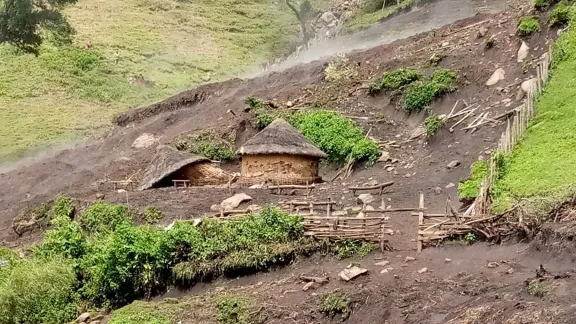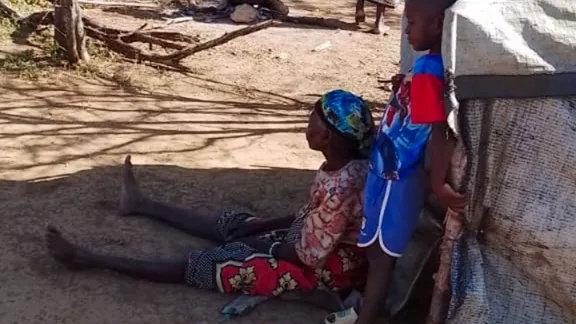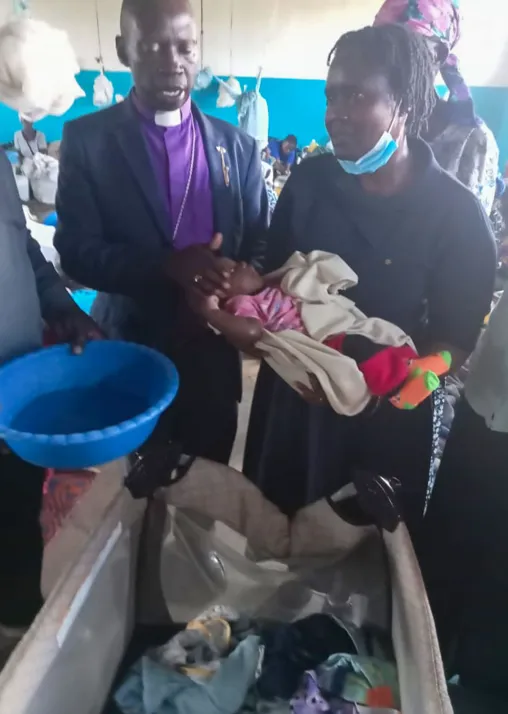
Devastation from heavy rains in the home of an ELCK congregant in West Pokot, North West Diocese. Photo: ELCK/Paul Loyomo
LWF communion solidarity boosts rapid assistance to those in dire need
(LWI) – With thousands of residents in three of its dioceses adversely impacted by the recent flooding and destruction following heavy rains across the country, the Evangelical Lutheran Church in Kenya (ELCK) says support to the most vulnerable people remains a priority.
“Within the ELCK area of operations, over 20,000 people have been displaced by floods following a back flow of water from Lake Victoria that left behind a trail of destruction: homes have been swept away, and 2,100 acres of crops destroyed,” said Archbishop Dr Joseph Ochola Omolo.
Across the country, heavy rainfall and flooding in April and May left nearly 300 people dead and thousands more displaced, swept away houses, crops and livestock, and destroyed infrastructure.

Families displaced by floods sought refuge in temporary shelters in Kitui, ELCK Eastern Diocese. Photo: ELCK/Simba Mambo
In the ELCK Lake Diocese where 600 displaced families were temporarily sheltered at Ombaka Primary School, the church’s personnel distributed clothing, beddings, food, medication and other basic items, with support from The Lutheran World Federation (LWF) Communion Solidarity Fund. The LWF established the fund in 2022 to encourage church-to-church solidarity to facilitate rapid response by churches when disaster occurs.
We have tried with our limited resources, but the needs are still overwhelming
Archbishop Dr Joseph Ochola Omolo, Evangelical Lutheran Church in Kenya

ELCK Lake Diocese Bishop Titus Okoda, baptizing a child at Ombaka camp, where 600 families displaced by flooding were sheltering. Photo: ELCK/Erick Omondi
“We have tried with our limited resources, but the needs are still overwhelming,” Archbishop Omolo said. The ELCK’s emergency disaster response initiative with LWF’s support will run until August. The church distributed emergency relief supplies to the most vulnerable families and continues to accompany them to rebuild their homes and livelihoods. This includes shelters for elderly widows whose houses were swept away by floods in the Lake Diocese, in the Central Eastern and North West Dioceses.
Spiritual accompaniment is part of the overall emergency response: praying with the affected and providing psychosocial support. During a visit and prayer service at the Ombaka camp, Bishop Titus Okoda conducted baptism.
Some of the dioceses are in regions where malaria is prevalent. The emergency response factored in distribution of mosquito nets to the most vulnerable families, including those sheltering at displaced people’s camp. The church personnel also worked with the county medical teams to ensure treatment for the sick as access to health care is disrupted when people are displaced.
“Although some of the families have started going back to their homes, a larger number are still expected to remain in the camp for nearly two months,” ELCK General Secretary Rev. Andrew Ngeiywa added.
The ELCK has 300,000 members in nine dioceses across Kenya.

The heavy rains and flooding damaged church buildings. The compound of an ELCK congregation in Kitui, Central Eastern Diocese. Photo: ELCK/Simba Mambo


